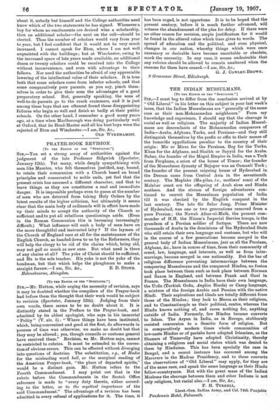[To TER EDITOR 011 TER SPECTATOR."
SIE,—Mr. Hutton, while urging the necessity of revision, says it may be doubted whether the compilers of the Prayer-book had before them the thought that their work would be subject 'to revision (Spectator, January 12th). Judging from their own words, there seems to be no doubt about it. It is distinctly stated in the Preface to the Prayer-book, and admitted by its ablest apologist, who says in his immortal " Polity " (V. xiv. 5) : " Where things have been instituted, which, being convenient and good at the first, do afterwards in 'process of time wax otherwise, we make no doubt but that they may be altered ; yea, though councils or customs general have received them." Revision, as Mr. Hutton says, cannot be restricted to rubrics. It must be extended to the correc- tion of obvious errors. This can be effected without diverging into questions of doctrine. The substitution, e.g., of Hades for the misleading word hell, or• the marginal reading of the American Prayer-book, "the place of departed spirits," would be a distinct gain. Mr. Hutton refers to the Fourth Commandment. I may point out that in the rubric before the Commandments in the Scotch Office reference is made 'to "every duty therein, either accord- ing to the letter, or to the tnystical importance of the said Commandment." The advantage of a revision has been admitted in every refusal of applications for• it. The time, it has been urged, is not opportune. It is to be hoped that the present century, before it is much further advanced, will witness the abandonment of the plea for delay. If there were no other reason for revision, ample justification for it would be found in the altered value which time gives to words. The spread of education and the political, and even physical, changes in our nation, whereby things which were once necessary or• desirable have become unsuitable or obsolete, mark the necessity. In any case, it seems undesirable that any rubrics should be allowed to remain unaltered when the reasons for• them have ceased.—I am, Sir, Jrc.,






































 Previous page
Previous page